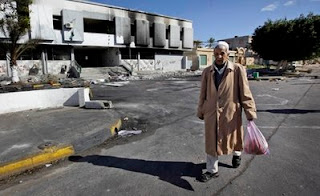 |
| A message on Nelly Furtado's Twitter account referenced the Victoria-born singer performing a 45-minute show for the Gadhafi clan in Italy in 2007. (Twitter) |
Furtado donates $1M from Gadhafi gig
Nelly Furtado is the latest recording artist to come under scrutiny for having performed for members of the Gadhafi family.
A post on the Canadian pop star's Twitter account notes she gave a private show for the family of Libyan leader Moammar Gadhafi four years ago.
"In 2007, I was paid $1 million by the [Gadhafi] clan to play a 45-minute show for guests at a hotel in Italy," reads the tweet, posted early Monday morning.
"I am going to donate this [money]."
A representative of Universal Music, Furtado's label, confirmed Monday afternoon that the Victoria-born singer wrote the short, online missive.
As the Arab world's recent wave of anti-government uprisings swept into Libya, Gadhafi ordered security forces to crack down on protesters, in an attempt to retain power.
Canada, the U.S., the U.K., the European Union and the UN Security Council have slapped sanctions on the country, once considered an ally of the West.
In the face of Gadhafi's actions, some have questioned performers from the West who have given private shows for the dictator's family in recent years.
News emerged in January 2010 that Beyoncé had performed at a lavish New Year's party hosted by one of Gadhafi's sons on the Caribbean island of St. Barts.
Meanwhile, recent leaked diplomatic cables obtained by WikiLeaks note that a year earlier, Mariah Carey received $1 million US to sing four songs at the 2009 edition of the holiday party.
It's not unusual for musicians to take corporate and private gigs. Inevitably, some come under fire for performing for controversial hosts.
"Private events like this happen all the time. I think most [artists] aren't really used to ever thinking about the source of the money.... In most cases, there isn't anything quite so obvious to be thought about," David T. Viecelli, agent for Arcade Fire and other acts, told CBC News on Monday.
"A lot was known about Gadhafi and his politics, so I think maybe somewhere in the chain of their decision-making process, there should have been some consideration for what it meant to take money from people like that, to sort of tacitly endorse what Moammar Gadhafi and his family are known for."
Richie gig kept under wraps
Lionel Richie, who has a large following in the Arab world, performed for Gadhafi himself in 2006. The singer visited Libya on the 20th anniversary of U.S. air strikes against the country, made in retaliation for the 1986 Berlin nightclub bombing.
Richie received $5 million US for performing at a purported peace concert and at a Gadhafi family wedding, according to journalist Rich Poplak, author of The Sheik's Batmobile: In Pursuit of American Pop Culture in the Muslim World.
"It was very, very hard to chase down the story," Poplak told CBC News. "Lionel Richie made very small mention of it in a GQ article.
"I actually went to Libya to chase down what I could about the concert. Nobody would speak about it.… I eventually did get some off-the-record information."
With the recent bloody crackdown against Libyan citizens, people are now calling on artists to pay more attention to ethical considerations and the track record of those they're performing for.
"Personally, I think it's disgusting," Poplak said. "There's this huge moral disconnect for these stars, who often have these foundations sponsoring youth in trouble or cancer and all that, but they're accepting large amounts of money from very, very dodgy men.
"It's very different taking money from a corporation than from a dictator like Gadhafi. There's no surprise about who this guy was."
Donating fee
Furtado's decision to make a charitable donation for the same amount that she was paid for the performance, however, has the support of both Poplak (who called it a "lovely gesture") and Viecelli.
"That's the right thing to be doing now," Viecelli said.
"She should think carefully about who she donates that money to, so that it has some real relevance to the issue at hand ... and I hope that everybody else who has, you know, earned money in a similar way is right now making their plans to do the same thing."
























